初三英语上册(外研版)Module 1 Wonders of the world 知识点总结
- 格式:docx
- 大小:113.84 KB
- 文档页数:22
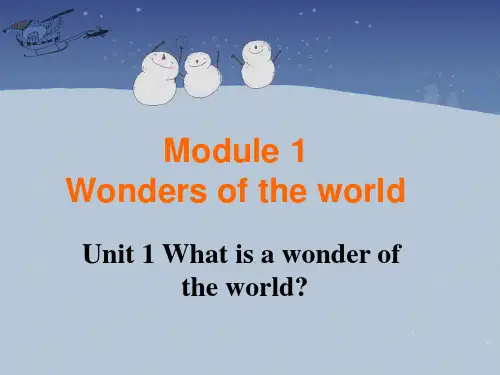
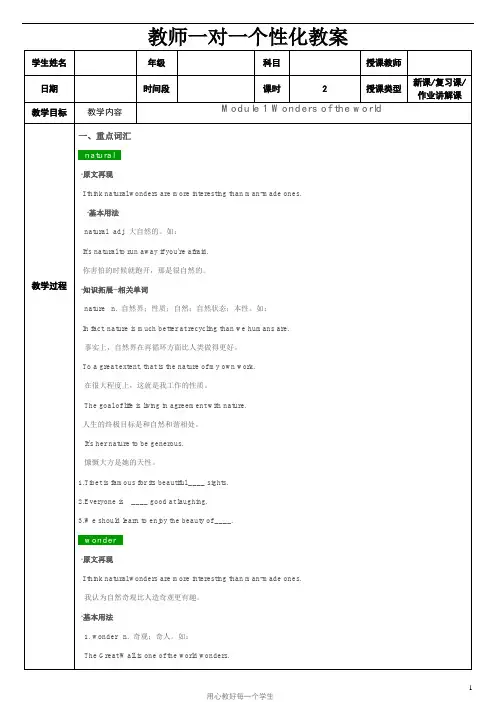
教师一对一个性化教案教学过程长城是世界奇观之一。
He’s a wonder with the way he arranges everything without any help.他不要任何帮助就把一起事情办妥了,真是个奇才。
2. wonder v. 想知道,相当于want to know,其后可接wh- +to v.或wh-从句,也可以接if(whether)引导的从句。
如:I was just beginning to wonder where you were.我刚才正琢磨你上哪儿去了呢。
I wonder if/whether they will arrive on time.我不知道他们是否能准时到达。
·知识拓展--相关单词wonderful adj. 精彩的;极好的。
如:Never before have I seen such a wonderful film .我从未看过如此精彩的影片。
1.The Grand Canyon is one of the ____of the world.2.It’s such a _____ song that we all like it.·原文再现Let’s call Wonders of the World and join in the discussion.我们给《世界奇观》节目打电话,加入讨论吧。
·基本用法discussion n. 讨论;议论。
如:We had a discussion about the differences between Britain and the US.我们讨论了英美两国的不同之处。
·知识拓展--相关单词discuss v. 讨论;谈论;商量,discuss sth. with sb.意为“与某人讨论某事”。
如:We need to discuss when we should go.我们需要商量一下应该什么时候动身。
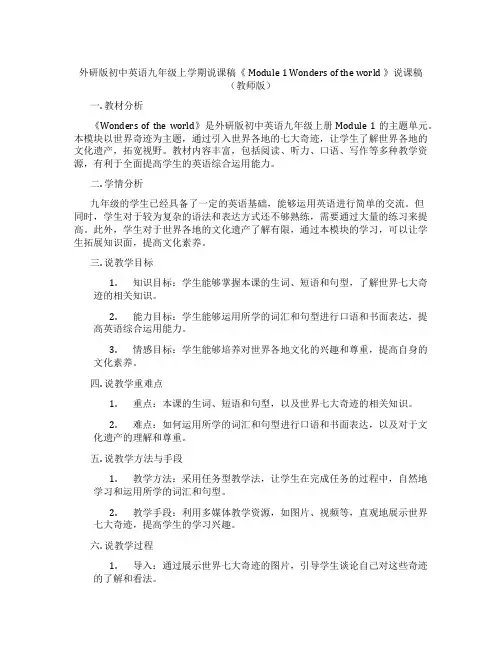
外研版初中英语九年级上学期说课稿《 Module 1 Wonders of the world 》说课稿(教师版)一. 教材分析《Wonders of the world》是外研版初中英语九年级上册Module 1的主题单元。
本模块以世界奇迹为主题,通过引入世界各地的七大奇迹,让学生了解世界各地的文化遗产,拓宽视野。
教材内容丰富,包括阅读、听力、口语、写作等多种教学资源,有利于全面提高学生的英语综合运用能力。
二. 学情分析九年级的学生已经具备了一定的英语基础,能够运用英语进行简单的交流。
但同时,学生对于较为复杂的语法和表达方式还不够熟练,需要通过大量的练习来提高。
此外,学生对于世界各地的文化遗产了解有限,通过本模块的学习,可以让学生拓展知识面,提高文化素养。
三. 说教学目标1.知识目标:学生能够掌握本课的生词、短语和句型,了解世界七大奇迹的相关知识。
2.能力目标:学生能够运用所学的词汇和句型进行口语和书面表达,提高英语综合运用能力。
3.情感目标:学生能够培养对世界各地文化的兴趣和尊重,提高自身的文化素养。
四. 说教学重难点1.重点:本课的生词、短语和句型,以及世界七大奇迹的相关知识。
2.难点:如何运用所学的词汇和句型进行口语和书面表达,以及对于文化遗产的理解和尊重。
五. 说教学方法与手段1.教学方法:采用任务型教学法,让学生在完成任务的过程中,自然地学习和运用所学的词汇和句型。
2.教学手段:利用多媒体教学资源,如图片、视频等,直观地展示世界七大奇迹,提高学生的学习兴趣。
六. 说教学过程1.导入:通过展示世界七大奇迹的图片,引导学生谈论自己对这些奇迹的了解和看法。
2.新课呈现:引导学生通过阅读文章,了解世界七大奇迹的详细信息,学习相关生词和短语。
3.课堂讨论:学生分小组进行讨论,讨论自己最喜欢的奇迹,并运用所学的句型进行表达。
4.练习巩固:通过完成练习题,检查学生对生词和短语的掌握情况,以及对文章内容的理解。
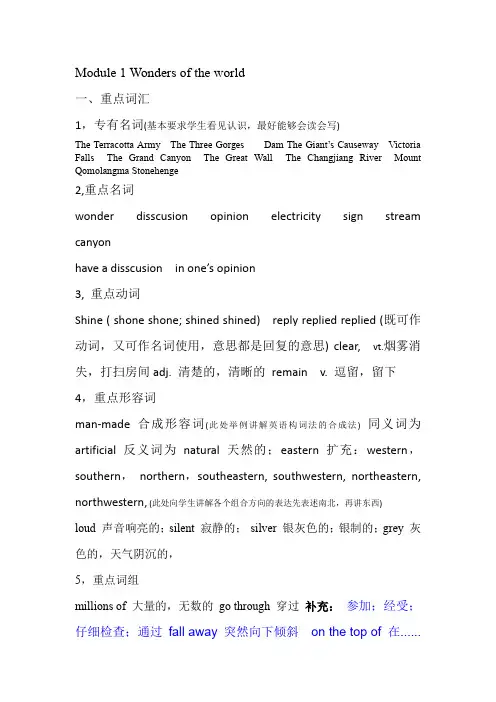
Module 1 Wonders of the world一、重点词汇1,专有名词(基本要求学生看见认识,最好能够会读会写)The Terracotta Army The Three Gorges Dam The Giant’s Causeway Victoria Falls The Grand Canyon The Great Wall The Changjiang River Mount Qomolangma Stonehenge2,重点名词wonder disscusion opinion electricity sign stream canyonhave a disscusion in one’s opinion3, 重点动词Shine ( shone shone; shined shined) reply replied replied (既可作动词,又可作名词使用,意思都是回复的意思) clear, vt.烟雾消失,打扫房间adj. 清楚的,清晰的remain v. 逗留,留下4,重点形容词man-made 合成形容词(此处举例讲解英语构词法的合成法)同义词为artificial 反义词为natural 天然的;eastern 扩充:western,southern,northern,southeastern, southwestern, northeastern, northwestern, (此处向学生讲解各个组合方向的表达先表述南北,再讲东西)loud声音响亮的;silent 寂静的;silver 银灰色的;银制的;grey 灰色的,天气阴沉的,5,重点词组millions of 大量的,无数的go through 穿过补充:参加;经受;仔细检查;通过fall away 突然向下倾斜on the top of 在......上面;盖住一、重点语法Unit 1 宾语从句的运用I think natural wonders are more interesting than man-made ones.And I think the Giant’s Causeway is the most fantastic natural wonder.重点讲解宾语从句的语序问题;引导词中的代词部分:that, what, which, who, whom, whose,引导副词how, when, where, why.和what to do,和how to do it.Unit 1~2 主要复习初中必考的6大时态总结初中必考6大时态的用法:最常见的一般现在时1) 经常性或习惯性的动作,常与表示频度的时间状语连用。
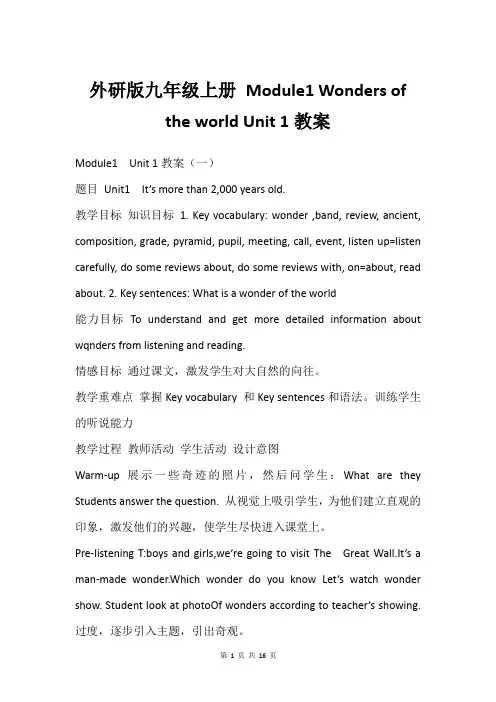
外研版九年级上册Module1 Wonders ofthe world Unit 1教案Module1 Unit 1教案(一)题目Unit1 It’s more than 2,000 years old.教学目标知识目标1. Key vocabulary: wonder ,band, review, ancient, composition, grade, pyramid, pupil, meeting, call, event, listen up=listen carefully, do some reviews about, do some reviews with, on=about, read about. 2. Key sentences: What is a wonder of the world能力目标To understand and get more detailed information about wqnders from listening and reading.情感目标通过课文,激发学生对大自然的向往。
教学重难点掌握Key vocabulary 和Key sentences和语法。
训练学生的听说能力教学过程教师活动学生活动设计意图Warm-up 展示一些奇迹的照片,然后问学生:What are they Students answer the question. 从视觉上吸引学生,为他们建立直观的印象,激发他们的兴趣,使学生尽快进入课堂上。
Pre-listening T:boys and girls,we’re going to visit The Great Wall.It’s a man-made wonder.Which wonder do you know Let’s watch wonder show. Student look at photoOf wonders according to teacher’s showing. 过度,逐步引入主题,引出奇观。
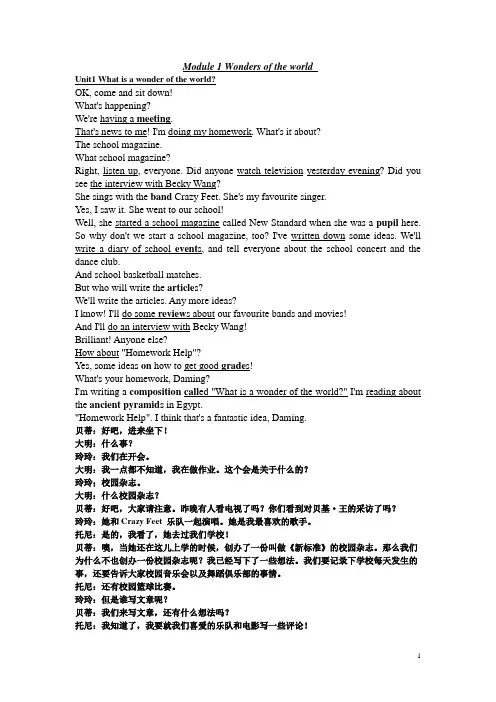
Module 1 Wonders of the worldUnit1 What is a wonder of the world?OK, come and sit down!What's happening?We're having a meeting.That's news to me! I'm doing my homework. What's it about?The school magazine.What school magazine?Right, listen up, everyone. Did anyone watch television yesterday evening? Did you see the interview with Becky Wang?She sings with the band Crazy Feet. She's my favourite singer.Yes, I saw it. She went to our school!Well, she started a school magazine called New Standard when she was a pupil here. So why don't we start a school magazine, too? I've written down some ideas. We'll write a diary of school event s, and tell everyone about the school concert and the dance club.And school basketball matches.But who will write the article s?We'll write the articles. Any more ideas?I know! I'll do some review s about our favourite bands and movies!And I'll do an interview with Becky Wang!Brilliant! Anyone else?How about "Homework Help"?Yes, some ideas on how to get good grade s!What's your homework, Daming?I'm writing a composition call ed "What is a wonder of the world?" I'm reading about the ancient pyramid s in Egypt."Homework Help". I think that's a fantastic idea, Daming.贝蒂:好吧,进来坐下!大明:什么事?玲玲:我们在开会。
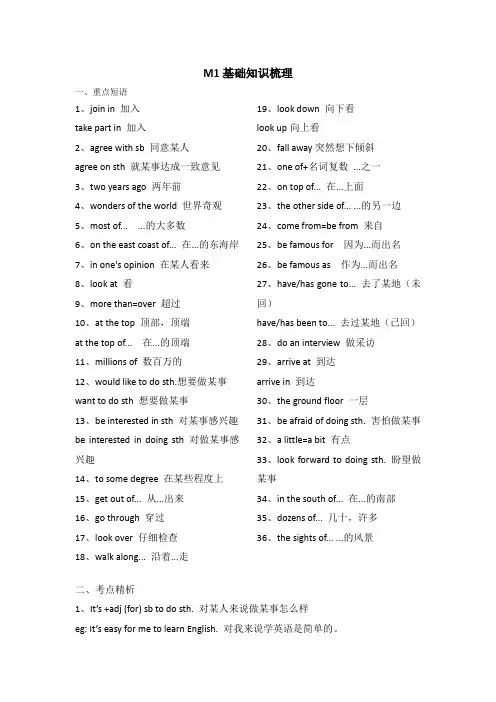
M1基础知识梳理一、重点短语1、join in 加入take part in 加入2、agree with sb 同意某人agree on sth 就某事达成一致意见3、two years ago 两年前4、wonders of the world 世界奇观5、most of... ...的大多数6、on the east coast of... 在...的东海岸7、in one's opinion 在某人看来8、look at 看9、more than=over 超过10、at the top 顶部,顶端at the top of... 在...的顶端11、millions of 数百万的12、would like to do sth.想要做某事want to do sth 想要做某事13、be interested in sth 对某事感兴趣be interested in doing sth 对做某事感兴趣14、to some degree 在某些程度上15、get out of... 从...出来16、go through 穿过17、look over 仔细检查18、walk along... 沿着...走19、look down 向下看look up向上看20、fall away突然想下倾斜21、one of+名词复数...之一22、on top of... 在...上面23、the other side of... ...的另一边24、come from=be from 来自25、be famous for 因为...而出名26、be famous as 作为...而出名27、have/has gone to... 去了某地(未回)have/has been to... 去过某地(已回)28、do an interview 做采访29、arrive at 到达arrive in 到达30、the ground floor 一层31、be afraid of doing sth. 害怕做某事32、a little=a bit 有点33、look forward to doing sth. 盼望做某事34、in the south of... 在...的南部35、dozens of... 几十,许多36、the sights of... ...的风景二、考点精析1、It’s +adj (for) sb to do sth. 对某人来说做某事怎么样eg: It’s easy for me to learn English. 对我来说学英语是简单的。
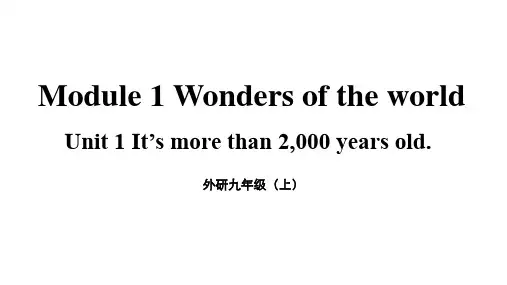
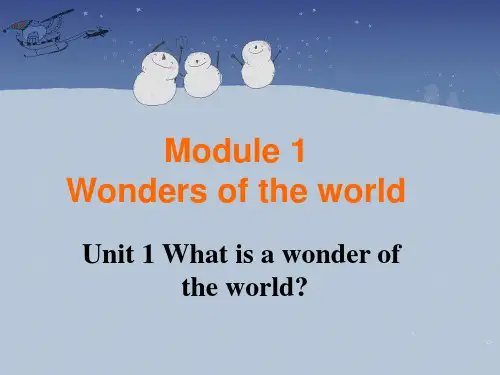
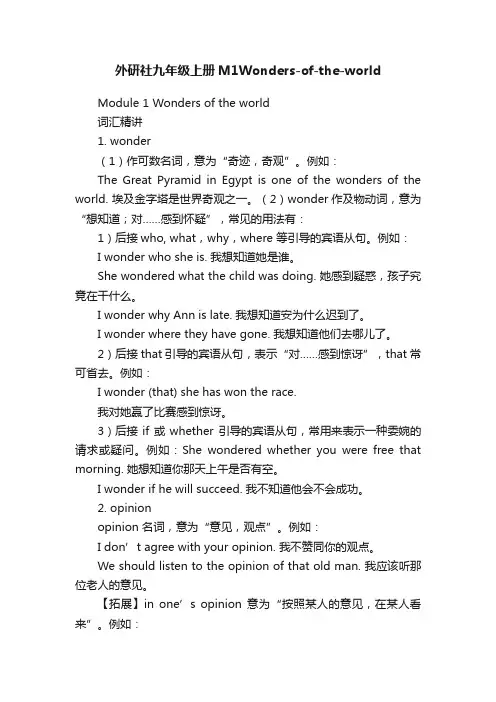
外研社九年级上册M1Wonders-of-the-worldModule 1 Wonders of the world词汇精讲1. wonder(1)作可数名词,意为“奇迹,奇观”。
例如:The Great Pyramid in Egypt is one of the wonders of the world. 埃及金字塔是世界奇观之一。
(2)wonder作及物动词,意为“想知道;对……感到怀疑”,常见的用法有:1)后接who, what,why,where 等引导的宾语从句。
例如:I wonder who she is. 我想知道她是谁。
She wondered what the child was doing. 她感到疑惑,孩子究竟在干什么。
I wonder why Ann is late. 我想知道安为什么迟到了。
I wonder where they have gone. 我想知道他们去哪儿了。
2)后接that 引导的宾语从句,表示“对……感到惊讶”,that常可省去。
例如:I wonder (that) she has won the race.我对她赢了比赛感到惊讶。
3)后接if 或whether 引导的宾语从句,常用来表示一种委婉的请求或疑问。
例如:She wondered whether you were free that morning. 她想知道你那天上午是否有空。
I wonder if he will succeed. 我不知道他会不会成功。
2. opinionopinion 名词,意为“意见,观点”。
例如:I don’t agree with your opinion. 我不赞同你的观点。
We should listen to the opinion of that old man. 我应该听那位老人的意见。
【拓展】in one’s opinion 意为“按照某人的意见,在某人看来”。
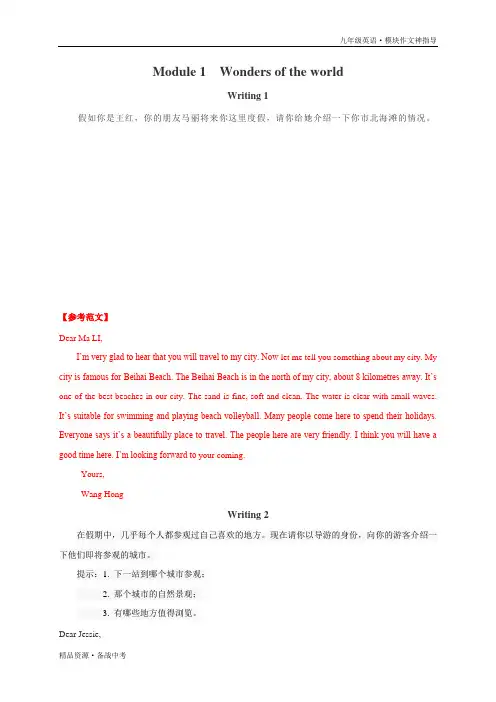
九年级英语·模块作文神指导Module 1 Wonders of the worldWriting 1假如你是王红,你的朋友马丽将来你这里度假,请你给她介绍一下你市北海滩的情况。
______________________________________________________________________________________ ______________________________________________________________________________________ ______________________________________________________________________________________ ______________________________________________________________________________________ ______________________________________________________________________________________ ______________________________________________________________________________________ ______________________________________________________________________________________ ______________________________________________________________________________________ 【参考范文】 Dear Ma LI,I’m very glad to hear that you will travel to my city. Now let me tell you something about my city. My city is famous for Beihai Beach. The Beihai Beach is in the north of my city, about 8 kilometres away. It’s one of the best beaches in our city. The sand is fine, soft and clean. The water is clear with small waves. It’s suitable for swimming and playing beach volleyball. Many people come here to spend their holidays. Everyone says it’s a beautifully place to travel. The people here are very friendly. I think you will have a good time here. I’m looking forward to your coming.Yours, Wang HongWriting 2在假期中,几乎每个人都参观过自己喜欢的地方。
外研版英语九上Module 1《Wonders of the world》(Unit 1)教学设计一. 教材分析《Wonders of the world》是外研版英语九上Module 1的教学内容,本节课主要介绍了世界上的一些奇迹,包括中国的长城和埃及的金字塔。
通过本节课的学习,学生可以了解不同国家的文化,拓宽视野,提高对英语学习的兴趣。
教材内容丰富,插图精美,有利于激发学生的学习兴趣。
二. 学情分析九年级的学生已经具备了一定的英语基础,能够进行简单的听、说、读、写操作。
但是,对于一些高级词汇和句型的理解仍然存在困难。
因此,在教学过程中,需要关注学生的个体差异,尽量让每个学生都能参与到课堂活动中来。
三. 教学目标1.知识目标:学生能够掌握与奇迹相关的词汇和句型,如“One of theseven wonders of the world”、“built over thousands of years”等。
2.能力目标:学生能够在适当的情境下运用所学知识进行交流,提高听说读写能力。
3.情感目标:通过学习,学生能够尊重和欣赏不同国家的文化,培养跨文化交际的意识。
四. 教学重难点1.重点:奇迹相关词汇的掌握和运用,以及句型的运用。
2.难点:对于一些高级词汇和句型的理解,如“be famous for”、“attractmillions of visitors each year”等。
五. 教学方法1.任务型教学法:通过完成各种任务,让学生在实际操作中运用所学知识。
2.情境教学法:创设各种情境,让学生在真实的语境中学习英语。
3.交际法:鼓励学生进行小组合作,进行互动交流,提高口语表达能力。
六. 教学准备1.教学课件:制作课件,包括文本、图片、视频等,以便于生动展示教学内容。
2.教学素材:收集与奇迹相关的中英文资料,用于拓展学生的知识面。
3.录音机、投影仪等教学设备:用于播放音频和视频材料。
七. 教学过程1.导入(5分钟)利用图片和视频展示长城和金字塔,引导学生谈论对奇迹的认识,激发学生的学习兴趣。
初三英语上册(外研版)Module 1 Wonders of the world知识点总结一、重点词汇·原文再现I think natural wonders are more interesting than man-made ones.我认为自然奇观比人造奇观更有趣。
·基本用法natural adj. 大自然的。
如:It's natural to run away if you're afraid.你害怕的时候就跑开,那是很自然的。
·知识拓展--相关单词nature n. 自然界;性质;自然;自然状态;本性。
如:In fact, nature is much better at recycling than we humans are.事实上,自然界在再循环方面比人类做得更好。
To a great extent, that is the nature of my own work.在很大程度上,这就是我工作的性质。
The goal of life is living in agreement with nature.人生的终极目标是和自然和谐相处。
It's her nature to be generous.慷慨大方是她的天性。
·原文再现I think natural wonders are more interesting than man-made ones.我认为自然奇观比人造奇观更有趣。
·基本用法1. wonder n. 奇观;奇人。
如:The Great Wall is one of the world wonders.长城是世界奇观之一。
He’s a wonder with the way he arranges everything without any help.他不要任何帮助就把一起事情办妥了,真是个奇才。
Module 1Wonders of the worldⅠ. 核心词汇形容词:1. 人造的adj. man-made2. 大自然的adj. natural3. 在东边的, 来自东边的adj. eastern4. (声音)响亮的adj. loud名词:5. 奇观; 奇迹n. wonder6. 讨论; 商讨n. discussion7. 看法; 主张n. opinion8. 电n. electricity连词:9. 虽然; 但是conj. though10. 按某人的意见; 据某人看来in one’s opinion11. 超过more than12. 大量的; 无数的millions ofⅡ. 重点句式1. 我从来没有见过它, 因此我不确定我同意你。
I’ve never seen it, so I’m not sure I agree with you.2. 两年前我参观了巨人之路。
I visited the Giant’s Causeway two years ago.3. 那听起来很神奇, 不过我认为非洲的维多利亚瀑布更壮观。
That sounds great, though I think Victoria Falls in Africa is even more fantastic.4. 它大约1 700米宽, 100米高。
It’s about 1, 700 metres wide and 100 metres high.5. 你可以在几千米之外的地方听见巨大的声音。
You can hear the loud noise a few kilometres away.6. 现在谁愿意第一个打电话呢?Now, who’d like to call first?考点1wonder n. 奇观; 奇迹(1)wonder作可数名词, 意为“奇观; 奇迹”; 作不可数名词, 意为“惊奇; 惊叹”。
(2)wonder作动词, 意为“感到诧异; 非常惊讶”, 后接that引导的宾语从句; 意为“想知道”, 后接who, where, what, how, if等引导的宾语从句。
外研版九年级英语上册Module 1 Wondersof the world写作指导Module 1 写作指导话题分析本模块的话题是“世界奇观”,与此相关的写作任务是介绍自然或人造景观。
写此类文章时,一般先点明该景观的位置和主要特点,然后介绍交通方式、游览时间及其主要景色,最后作总结式评价。
介绍景观时多用一般现在时态,使用频率较高的单词和短语有visit,enjoy oneself,wonder,beautiful等。
常用句型1.The Niagara Falls is one of the greatest natural wonders of the world. 2.The Great Wall is a manmade wonder.3.It's more than 2,000 years old.4.In my opinion / For me,manmade wonders are more exciting than natural ones.5.I look down to the Colorado River,a silver stream nearly one mile below me.6.Thousands of people walk along the Great Wall every year.7.I'd like to visit the Giant's Causeway because I love wild places by the sea.写作储备1.Go there by bike/bus/train/plane...2.There be (is/are/was/were)...3.be known to.../be famous for...4.One of the greatest wonders...5.One of the most popular places of interest...6.Every year thousands of people from home and abroad come to visit it.典型示例一黄山(Mount Huangshan)是中国最著名的自然奇观之一,位于安徽省南部。
九年级英语外研版(上)Module1Wondersoftheworld九年级英语外研版(上)Module 1 Wonders of the world短语归纳1.wonders of the world世界奇观natural wonders 自然奇观man-made wonders 人造奇观2.join in参加;加入(活动) = take part in3. I’m not sure. 我不确信4. agree with sb. 同意某人的看法sb. agree with sth. 某人适应(食物、气候)agree to do sth. 同意做某事agree to sth.(plan /decision/suggestion) 同意/赞成agree on sth.( plan/ ) 在……方面意见一致5. on the eastern coast of ...在、、、、、、的东海岸6. in one’s opinion据某人看来;按某人的意见7. more than = over 多于,超过8. produce electricity 供电9. millions of 数百万的;数以百万计的10. would like to do sth. = want to do sth. 想做某事Would like sb. to do sth. 想要某人做某事11. early morning 大清早12. become grey变成灰色13. get out of ...从....出来14. go through 意为“穿过,强调从物体内部穿过”;从头至尾的练习15. fall away突然向下倾斜16. look over 从(某物上面)看过去:仔细检查look across眺望look down to 俯视;向下看17. on top of 在.....顶部18. at the bottom of在.....的底部19. on both sides在两边20. be famous for意为“以.......而闻名”21. do an interview做采访do an interview with sb. 采访某人22. draw a picture of 画一副......的图画23. go down下去;下沉;坠落24. wait for 等候25. dozens of 许多26. in height高度;在高度上用法集萃1.agree with sb 同意某人agree to do sth 同意做某事2.in +一段时间在.....(多长时间)之后,常用于回答How soon 的提问3.have been/gone to 以及have been in的区别4.because of+名词因为。
Module 1 Wonders of the world1.east (n.东部,东边)—eastern (adj.在东边的;来自东边的)2.loud [adj.(声音)响亮的]—loudly (adv.响亮地;大声地)3.nature (n.大自然) natural (adj.大自然的) naturally (adv.自然地)4.wonder (n.奇迹;奇观)wonderful (adj.精彩的)wonderfully (adv.很好地)wonderland (n.奇境)5.discuss (v.讨论)—discussion (n.讨论;商讨)6.silent (adj.寂静的)—silence (n.寂静)1.more than超过less than少于2.join in加入(活动),参加3.agree with sb.同意某人的看法4.on the eastern coast of 在……的东海岸5.in one’s opinion 按某人的意见;据某人看来lions of 大量的;无数的thousands of 成千上万的dozens of 许多7.be interested in 对……感兴趣8.to some degree 在某种程度上9.look to the east 向东边看10.look to one’s left/right 朝某人的左侧/右侧看11.get out of 从……出来12.go through 穿过13.walk along 沿着……走14.look over 眺望……15.look down(to)向下看;俯视16.fall away 突然向下倾斜17.on top of 在……上面;盖住18.at the bottom of 在……的底部19.be famous for 因……而闻名20.at the end of在……的末端/尽头21.the ground floor一楼,底层22.in the south of在……的南部23.because of 因为,由于24.in the dark 在黑暗中25.wonders of the world 世界奇观1.be(not)sure+从句(不)确信……2.in+时间段一段时间之后3.be afraid of(doing)sth. 害怕(做)某事4.have/has gone to 去了某地,还未回来have/has been to去过某地,已经回来5.one of the+形容词最高级+可数名词复数最……的……之一6.look forward to(doing)sth. 盼望(做)某事作文素材:描述旅行经历或某个景观词汇lie in 位于natural wonder自然景观tourist attraction 旅游景点be regarded as 被看作be interested in...对感兴趣thousands of 成千上万的be built in建造于man-made wonder 人造景观in one's opinion 在某人看来a symbol of… ……的象征be famous for 因……而闻名the best time to visit 参观的最佳时间句子1.…is one of the greatest wonders of theworld.……是世界上最伟大的奇观之一。
初三英语上册(外研版)Module 1 Wonders of the world知识点总结一、重点词汇natural·原文再现I think natural wonders are more interesting than man-made ones.我认为自然奇观比人造奇观更有趣。
·基本用法natural adj. 大自然的。
如:It's natural to run away if you're afraid.你害怕的时候就跑开,那是很自然的。
·知识拓展--相关单词nature n. 自然界;性质;自然;自然状态;本性。
如:In fact, nature is much better at recycling than we humans are.事实上,自然界在再循环方面比人类做得更好。
To a great extent, that is the nature of my own work.在很大程度上,这就是我工作的性质。
The goal of life is living in agreement with nature.人生的终极目标是和自然和谐相处。
It's her nature to be generous.慷慨大方是她的天性。
wonder·原文再现I think natural wonders are more interesting than man-made ones.我认为自然奇观比人造奇观更有趣。
·基本用法1. wonder n. 奇观;奇人。
如:The Great Wall is one of the world wonders.长城是世界奇观之一。
He’s a wonder with the way he arranges everything without any help.他不要任何帮助就把一起事情办妥了,真是个奇才。
2. wonder v. 想知道,相当于want to know,其后可接wh- +to v.或wh-从句,也可以接if(whether)引导的从句。
如:I was just beginning to wonder where you were.我刚才正琢磨你上哪儿去了呢。
I wonder if/whether they will arrive on time.我不知道他们是否能准时到达。
·知识拓展--相关单词wonderful adj. 精彩的;极好的。
如:Never before have I seen such a wonderful film .我从未看过如此精彩的影片。
discussion·原文再现Let’s call Wonders of the World and join in the discussion.我们给《世界奇观》节目打电话,加入讨论吧。
·基本用法discussion n. 讨论;议论。
如:We had a discussion about the differences between Britain and the US.我们讨论了英美两国的不同之处。
·知识拓展--相关单词discuss v. 讨论;谈论;商量,discuss sth. with sb.意为“与某人讨论某事”。
如:We need to discuss when we should go.我们需要商量一下应该什么时候动身。
eastern·原文再现It runs for several hundred metres on the eastern coast of Northern Ireland.它在北爱尔兰的东海岸绵延几百米。
·基本用法eastern adj. 在东边的;来自东边的。
如:The eastern situation becomes better now.东部的情况现在有所好转。
·知识拓展--相关单词1. southern adj. 南方的。
如:He lives in southern China.他住在中国南部。
2. northern adj. 北方的。
如:That’s a large city in northern Greece.那是希腊北部的一个大城市。
3. western adj. 西方的。
如:These handkerchiefs sell well in the western market.这些手帕在西方市场销路很好。
注:western还可用作名词,意为“西方人;西部片;西部小说”。
如:India is a mysterious land in the mind of Western.在西方人心目中,印度是一片神秘的土地。
though·原文再现That sounds great, though I think Victoria Falls in Africa is even more fantastic.它(巨人之路)很神奇,但我认为非洲的维多利亚瀑布更壮观。
·基本用法though adv.&conj. 虽然,尽管。
如:Though the task was difficult, they managed to accomplish it on time.尽管任务困难,他们仍按时完成了。
·知识拓展相关单词though=although。
如:I did not know that then, although I learned it later.当时我不知道那件事,然而我后来知道了。
相关短语even though 即使。
如:Even though I hadn't seen my classmate for many years, I recognized him immediately. 即使多年没有看见我的同学,我也马上认出了他。
loud·基本用法1.loud adj. 高声的;大声的。
如:He answered the question in a loud voice.他大声回答了这个问题。
2. loud adv. 高声地;大声地。
如:Speak louder; I can’t hear you.大声点,我听不见你说的话。
·知识拓展--词义辨析:aloud/loud/loudly1. aloud:adv. “出声地”有使能听得到的意味。
如:Please read the story aloud.请朗读这个故事。
They were shouting aloud.他们在高声地呼喊。
2. loud:adv“高声地、大声地、响亮地”常指在说笑等方面。
如:Don’t talk so loud.不要如此高声地谈话。
Speak louder.说得大声点。
3. loudly:adv. “高声地”有时与loud 通用,但含有喧闹的意味。
如:Someone knocked loudly at the door.有人大声敲门。
Don’t talk so loudly(loud).不要如此高声地谈话。
opinion·原文再现But in my opinion, man-made wonders are more exciting than natural ones.但是在我看来,人造奇观比自然奇观更激动人心。
·基本用法opinion n. 意见;主张;看法;判断,in one’s opinion意为“按某人的意见;据某人看来”。
如:I can't agree with your opinion in this respect.在这方面,我不赞同你的意见。
In my opinion, that’s an excellent idea.我认为那是一个极好的主意。
more than·原文再现It’s more than 2,000 years old.它有两千多年的历史。
·基本用法more than意为“超过”;“more than+数词”表示“以上”。
如:I have known David for more than 20 years.我认识戴维有20多年了。
·知识拓展more than 还有以下用法:1. “more than+名词”表示“不仅仅是”。
如:Modern science is more than a large amount of information.现代科学不仅仅是大量的信息。
2. “more than+形容词”表示“很、非常”。
如:I am more than glad to help you.我很荣幸能帮助你。
3. “more than+that从句”表示“简直不;远非;难以;完全不能”。
如:That is more than I can understand.那非我所能懂的。
相关短语1. no more than仅仅;只有;最多不超过,强调少。
如:This test takes no more than thirty minutes.这个测验只要30分钟。
2. not more than是more than的否定形式,意为“不多于;不超过”。
如: She has no more than three hats.她只有三顶帽子。
electricity·原文再现It produces electricity for millions of people in China.它为中国上百万的人们提供电源。
·基本用法electricity n. 电。
如:While I was cooking supper the electricity went off.我正在做晚饭时停电了。
·知识拓展--相关单词1. electric adj. 电的;电动的。
如:They still live in the houses without electric lights.他们仍然住在没有电灯的房子里。
2. electrical adj. 电的;与电有关的。
如:There is a fault in the electrical system.电路系统出了故障。
millions of·原文再现It produces electricity for millions of people in China.它为中国上百万的人们提供电源。
·基本用法millions of 意为“大量的;无数的”,其后可接可数名词的复数形式,不与表示具体数字的数词连用。